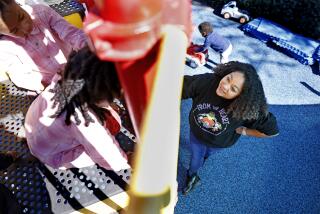Study Finds Day Care No Learning Bar
- Share via
WASHINGTON — The most comprehensive study ever conducted on the effects of day care has found that young children in the care of others while their parents work generally suffer no disadvantage in cognitive or linguistic development.
Dr. Duane Alexander, director of the National Institute of Child Health and Human Development, which sponsored the study, called the finding that children’s cognitive development is not harmed by day care “the most striking aspect of these results.”
Alison Clarke-Stewart, a UC Irvine developmental psychologist overseeing the study of 110 Orange County children participating in the nationwide research, said children whose caregivers spoke to them often and responded to them scored higher on six standardized tests measuring knowledge, intelligence and language skills.
“High quality care means the caregiver is involved and responsive. They talk to the children and are interactive with them,” she said. “If that happens, then it appears kids will get a little boost in terms of development.”
The results are based on a federally funded study that so far has tracked 1,300 children from birth to age 3. The first phase of the study, released last year, concluded that day care itself did not harm children’s emotional attachment to their mothers.
Clarke-Stewart said the study, to be released today, reinforces the findings of previous, smaller-scale studies that show the importance of verbal and intellectual stimulation--whether provided by a parent, day-care center or baby sitter--in early childhood development.
But the study also found a weak, negative link between long hours in “nonmaternal” care and the quality of interaction between children and their mother.
The more hours a child spends in day care, the study showed, the more negative and less sensitive a mother is toward the child in situations observed by researchers. At 2 and 3 years old, a child cared for by others also is less affectionate toward the mother in proportion to the amount of day care that the child received.
*
The study comes at a time when unprecedented numbers of U.S. women with preschool children are in the paid labor force. Government statistics show that 62% of mothers with children under 6--a total of 10.3 million women--work for pay either part time or full time.
The vast majority of these women use some form of day care for their children, either day care centers or more informal arrangements with relatives or friends. The federal study is based on research involving all such arrangements.
The study also confirmed an earlier finding by the same group of researchers that the most significant factors in determining how well a child fares are family economic status, the mother’s psychological well-being and intelligence, the child’s gender and infant temperament.
The study did not attempt to suggest what type of child care offered the best quality. Neither did it compare whether children in poor-quality care developed as well as children in their mother’s care.
If a mother, especially one with a rich vocabulary and stable family finances, talks frequently to her baby and responds to the child’s needs, the child is more likely to develop strong maternal bonds and a solid cognitive foundation, regardless of the child’s day-care situation, researchers said.
Clarke-Stewart said it is difficult to quantify that advantage.
“In practical terms we’re not there yet,” she said.
High-quality day care, which Clarke-Stewart said is most frequently provided at large child-care centers, boosted children’s cognitive and linguistic development. And at several ages, it even improved the quality of their interaction with their mothers.
*
By contrast, when poor women placed their children in what Clarke-Stewart called low-quality care, most of it informal baby-sitting arrangements with friends or relatives, they were found to have a less-healthy interaction with those children at 2 years of age.
Clarke-Stewart said the message is if you need to find day care, make sure the providers interact frequently and intelligently with the children.
“You should look for a caregiver who is positively stimulating and involved with the child,” she said.
*
“There is a lot of concern both from mothers and people in the field because it’s a relatively new phenomenon that babies, very young babies, are being cared for by someone other than mom,” Clarke-Stewart said.
“As long as the parent is going to have to make a decision for new children it’s always going to be an issue,” she said. “It’s good to be concerned about this. You have to be concerned.”
Use of day care is likely to swell in coming years, as welfare reforms push as many as 4 million poor women into jobs. This surge of new working women, many of them single parents with special needs but scant funds to pay for child care, is certain to raise many of the questions addressed in the new study concerning the quality of child care and the length of time children should be in such situations.







